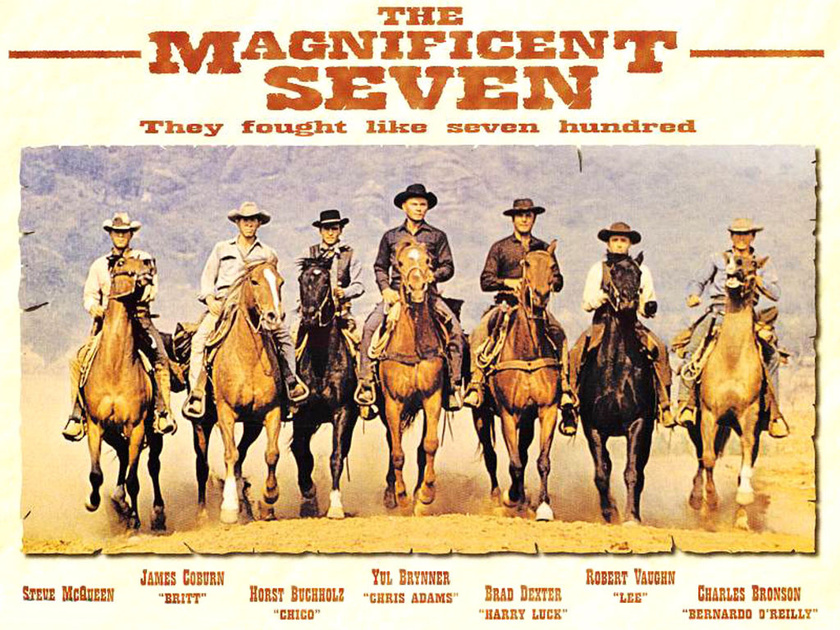The years have been kind to 1960’s The Magnificent Seven.
At the time of the film’s release it wasn’t terribly well received by critics or audiences. Critics were still basking in the majesty of Akira Kurosawa’s Seven Samurai, the New York Times saying it’s a, "pallid, pretentious and overlong reflection of the Japanese original.” While it’s doubtful that general audiences knew or cared about the source, they had plenty of other westerns to watch on TV and at the movies. Randolph Scott, Audie Murphy, John Wayne, and Burt Lancaster had movies, big and small, that year and firmly staked claims on the silver screen.
Gunsmoke and Bonanza were still riding the airwaves.
Who cared about Yul Brynner from period pieces and Steve McQueen (that TV actor) leading a bunch of relative unknowns in another oater? Now, those unknowns went on to be big stars. And director John Sturges went on to bigger and better things himself. But in a flooded market something was bound to take a small hit. The Magnificent Seven, apparently, was one of those movies.
Now it’s iconic, just for the music alone (which I’m sure you’re hearing in your head right now).
The story is basic. A Mexican village is under attack by a vicious gang led by Calvera (Eli Wallach) and reaches out for help from gun-for-hire Chris (Brynner). They can’t pay much, nothing compared to what gunfighters rate, but Chris is able to gather six more men to help these poor souls defend themselves. It’s the principle of thing. They may be killers, but they’re killers with a code of honor and sympathy for the oppressed.
The Seven are magnificent not for what they can do, but for who they are.
They respect the villagers and hold them in high esteem. When the boys of the village call their fathers cowards, O’Reilly (Charles Bronson) says:
“Don't you ever say that again about your fathers, because they are not cowards! You think I am brave because I carry a gun? Well, your fathers are much braver because they carry responsibility, for you, your brothers, your sisters, and your mothers. And this responsibility is like a big rock that weighs a ton. It bends and it twists them until finally it buries them under the ground. And there's nobody says they have to do this. They do it because they love you, and because they want to. I have never had this kind of courage. Running a farm, working like a mule every day with no guarantee anything will ever come of it. This is bravery. That's why I never even started anything like that... that's why I never will.”
It’s the classic western trope of the uncivilized man fighting and dying for a world in which he will never belong.
The film dwells on that fact, and each of the Seven mourns it in his own way. In the final climax some of them die, others go back to the only lives they’ll ever know with a sense of resignation. The last line is, “The old man was right. Only the farmers won. We lost. We always lose.” Perhaps audiences didn’t latch onto this movie because at its heart it’s a tragedy. While one of the men does decide to leave the life and chooses civilization, we knew from the start that he wasn’t born for violence and solitude. And thus, it’s a small, if touching, comfort.
There’s been talk recently as to whether a remake has ever been as good as or superior to the sequel.
The Magnificent Seven is equal to Seven Samurai because it takes the story and uses it to emphasize different universal truths which will appeal to a different audience. The American ethos is different from the Asian, yet what is good, heartbreaking, and inescapable knows no cultural bounds. Some cultures just respond to, or need to hear, certain things more than others. It’s a great film in its own right, with amazing performances and a sense of sincerity that is timeless. The gunfighters may lose, and the farmers may win, but we, the audience, are the benefactors.

























